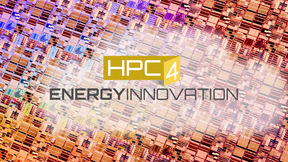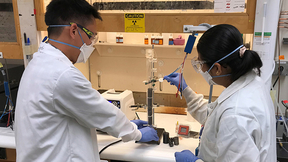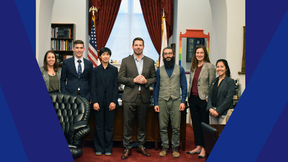Entrepreneurship meets the national labs
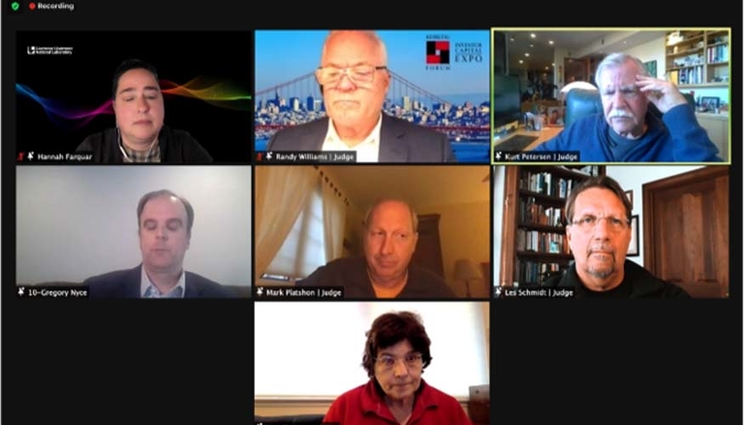 (Download Image)
(Download Image)
Researchers from 10 national labs came together for the National Accelerator Pitch Event, a virtual showcase of Department of Energy innovation where scientists pitched their business model ideas to seasoned investors and competed for a $25,000 prize for work to advance commercialization.
Earlier this month, researchers from 10 national labs came together for a virtual showcase of Department of Energy (DOE) innovation when scientists pitched their business model ideas to seasoned investors and competed for a $25,000 prize for work to advance commercialization.
The National Lab Accelerator Pitch Event, something like the “Shark Tank” television program, is a competition format and a rare opportunity for the business community to learn firsthand about the diverse science and technology across the DOE national laboratory complex.
Investors and entrepreneurs evaluate the commercial potential of innovations for transfer to the private sector.
“It’s always a pleasure to see what bright minds are thinking about, said Les Schmidt, a judge for the pitch event. "(These researchers have put together) lots of good efforts to improve our world and that's very exciting.”
Schmidt is the founder and executive director of BRIIA, a San Ramon-based startup accelerator for artificial intelligence companies.
Scientists competing in the event were given 10 minutes to pitch the commercial value of their technology, followed by 10 minutes of questions from the judges and other investors in the audience.
The judges panel consisted of five members of the investment community. In addition to Schmidt, judges included Randy Williams, Keiretsu Forum; Kurt Petersen, Band of Angels; Mark Platshon, Icebreaker Ventures; and Joan Plastiras, Band of Angels.
Under the direction of Roger Werne and Hannah Farquar, both of the Lab’s Innovation and Partnerships Office (IPO), LLNL has organized and managed the National Lab Accelerator Program since 2017.
The program has received funding from the DOE Office of Technology Transitions since 2019.
Werne, a senior adviser within IPO, has invested extensive time and energy in developing a robust business network with representatives from the Bay Area and Silicon Valley investment and entrepreneurial communities.
The interactions with this network have laid the foundation for the National Lab Accelerator Program, teaching entrepreneurial skills to scientists and engineers, who can use those skills to spur innovation in their national security work.
“The network of representatives from the Bay Area and Silicon Valley investment and entrepreneurial communities is a group of successful, technology-oriented, business entrepreneurs, who have a continuing interest in finding new technologies,” Werne said. “They want to solve important problems and lead to successful businesses.
“The San Francisco Bay Area is fortunate to have what is probably the largest collection of such individuals in the world, who are willing to share their experience and knowledge with the national labs in pursuit of new business opportunities.
“One of the goals that Hannah and I have is to share this network with the rest of the DOE national lab community to benefit the entrepreneurs and investment people, the national labs and ultimately the American people.”
The pitch events are the culmination of months of training. Competition provides a valuable way for the scientists to test their training and knowledge of their entrepreneurial skills.
LLNL hosted a local pitch event, also called a “shark tank,” on Nov. 18, where four LLNL scientists competed. These teams spent nine months meeting with business mentors and honing their pitch presentations to ready themselves for the competition.
Greg Nyce was the LLNL winner with his pitch, “Antimicrobial Therapeutics From Plastic: Reimagining the Value of an Empty Plastic Bottle.”
His fellow LLNL competitors included Teresa Berry and Colin Yamaoka pitching Moonquake, an immersive and fun multi-modal learning game that fosters an inclusive culture in companies; Randy Roberts pitching Geovisipedia, a satellite imagery-fueled visual database with potential impact in industries from economic forecasting to insurance claim estimation; and David “Scott” Andrews pitching “Clean Cash™,” an automated paper money ultraviolet-sanitizing machine. Nyce earned the right to represent LLNL at the national pitch event on Dec. 2.
Other national labs that sent researchers to the national pitch event included Brookhaven, Los Alamos, Sandia, Lawrence Berkley, Idaho, Argonne, the National Renewable Energy Laboratory and the National Energy Technology Laboratory. The pitch presentations are available for viewing.
The winner of the National Lab Pitch Event was Curtis Larimer of Pacific Northwest National Laboratory. He presented "ElastiDry Protective Coating," a groundbreaking liquid repellent material that, when applied to personal protective equipment such as gloves, face shields, shoes or protective suits, reduces infection and contamination in health care settings.
“It was enlightening to hear questions from investors to the scientists — different questions than national lab scientists typically encounter,” Farquar said. “The interaction will no doubt make them think about solving their problems differently and advance the development and transition of these innovations.”
Plastiras, a Band of Angels investor and pitch event judge, was encouraged by all the presentations.
“I would not be surprised to learn that a non-winner of our competition has the best success.”
Farquar said she is encouraged by the interest of the Bay Area and Silicon Valley investment communities in participating in the progress toward economic development for all DOE innovations.
“The connections made, even in the virtual environment, are critical for building networks and moving lab technologies from experiment to real world products, where the impact of research can be amplified,” she said. “We are continuing to field requests for introductions spurred by the presentations.”
The pitch events were produced in partnership with the University of California Davis Institute for Innovation and Entrepreneurship, with major contributions from Niki Peterson, Jenna Makus, Lindsay Lowry and Sumiko Hong.
Contact
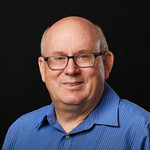 Stephen Wampler
Stephen Wampler
[email protected]
(925) 423-3107
Related Links
LLNL Innovation and Partnerships Office (IPO)Tags
Industry CollaborationsTechnology Transfer
Featured Articles
